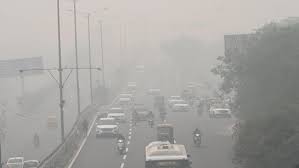New Delhi is blanketed by a dense and toxic haze after air pollution levels soared to more than 16 times the World Health Organization’s (WHO) recommended safe limit. Authorities have issued urgent health warnings as the city faces one of its worst smog episodes of the year.
Fireworks After Diwali Blamed for Pollution Spike
The surge in pollution is largely attributed to the widespread use of fireworks and firecrackers during Diwali celebrations. These activities release vast amounts of particulate matter (PM2.5 and PM10) and toxic chemicals into the atmosphere, drastically reducing air quality across the capital.
Residents have reported low visibility, persistent coughing, and throat and eye irritation. The situation has prompted authorities to advise citizens—especially children, the elderly, and people with respiratory illnesses—to stay indoors and wear protective masks when outside.
Hospitals Report Surge in Respiratory Cases
Local hospitals are witnessing an increase in respiratory-related admissions, with doctors warning of potential long-term effects on lung health. Many healthcare facilities have strengthened emergency responses to manage the rise in patients suffering from asthma, bronchitis, and other pollution-related ailments.
Criticism Over Firework Use and Weak Enforcement
Environmental groups have criticized the continued use of fireworks, warning of the environmental and health consequences. Although some Indian cities have imposed temporary bans and restrictions on firecracker sales and usage, enforcement remains weak, especially during the festive period.
Pollution Expected to Linger
Meteorologists warn that the toxic haze may persist for several days due to calm winds and lower temperatures, which trap pollutants close to the ground. Air quality monitoring stations across Delhi have reported hazardous AQI readings, prompting renewed calls for stricter pollution control measures.
Authorities Urge Precautionary Measures
Government agencies are urging residents to minimize outdoor activity, use air purifiers indoors, and monitor conditions through air quality apps. Officials continue to coordinate cleanup and enforcement efforts as New Delhi battles another severe smog episode amid growing health concerns.

